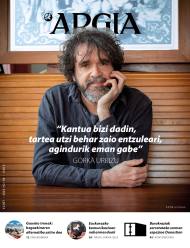What is independence like?
The independence of Euskal Herria and Catalonia is the object of study abroad. The University of Nevada, in Reno, USA, has just published an important book Pro-independence movements in the Basque Country and Catalunya, under the responsibility of three experts: Xabier Irujo, Queralt Solé and Antoni Segura. It brings together the work of thirteen teachers and researchers to explore the path to independence of the two aforementioned nations and to propose comparisons with cases from other nations such as Scotland, Quebec, Flanders or Greenland. The possibilities of independence are analysed in depth and, when the possibilities are measured in the conclusions, there are some that appear to be certain: “The creation of Basque, Catalan and Scottish republics in Europe is inevitable, it is a matter of time.”
Such an optimistic approach contrasts with the analyses and assessments coming from elsewhere. The official sociological studies of opinion, both at the state and autonomous levels, repeat over and over again that, after the experiences of the last decades, both in Catalonia and in the Basque Country, the desire for independence is declining among the citizens. Having heard this, the Spanish President-in-Office exalts the virtues of his negotiating and inclusive policy.
The arguments of the dominant States and their servers do not convince us, but they do accuse a large group of subordinate citizens.
These studies of the current State and the related entities are not reliable, as they make very interested readings. The research and results offered in this book are much closer to reality, even to the possibilities of the future. First, they do not cheat on the premises of the object of study or on the main arguments. For example, they say that independence cannot be a unilateral decision, but book experts demonstrate that the formation of these imposing states was unilateral and imposed by violence in all cases. In Scotland from 1707, in Catalonia from 1707-1716, and from 1789 in Iparralde and after 1833 in Hego Euskal Herria. Consequently, the liberation of these oppressive states and the constitution of a state of its own is logically a unilateral decision. According to the Declaration of Independence of EE.UU. in 1776, “when it is necessary to undo the political ropes that have united one people with another, nations have the right to freedom.”
The arguments of the dominant States and their servers do not convince us, but they do stimulate, counteract, make a large number of dependent citizens. That is what happens to us, unfortunately. Not only those on the street, but also politicians, university professors, communicators, researchers, opinion leaders, etc., are softened, molded, added to these dictates of the authorities, say mothers and assume official lies.
Not for nothing, in the United States, the most credible studies about our independence are published. Not few local experts and politicians “said independence but now I say coexistence”, or when we hear “I defended the state but now better the new status”. Remember that what happened in the Gernika bombing also had to be clarified by good historians abroad, while the locals, including some from Gernika, said that there were “a few dead”, or that it was “the German Nazis”.
We have to bring independence. How? Attend to reliable experts and follow our being, our personality and our heart.
Bidali zure iritzi artikuluak iritzia@argia.eus helbide elektronikora
ARGIAk ez du zertan bat etorri artikuluen edukiarekin. Idatzien gehienezko luzera 4.500 karakterekoa da (espazioak barne). Idazkera aldetik gutxieneko zuzentasun bat beharrezkoa da: batetik, ARGIAk ezin du hartu zuzenketa sakona egiteko lanik; bestetik, egitekotan edukia nahi gabe aldatzeko arriskua dago. ARGIAk azaleko zuzenketak edo moldaketak egingo dizkie artikuluei, behar izanez gero.
Jakina da lan ikuskariak falta ditugula geurean. Hala ere, azken egunotan datu argigarriak ematea lortu dute: lan ikuskaritzaren arabera, EAEko enpresen %64ak ez du ordutegien kontrolean legedia betetzen. Era berean, lehendakariordeak gaitzetsi du, absentismoaren eta oinarrizko... [+]
Martxoaren 8a hurbiltzen ari zaigu, eta urtero bezala, instituzioek haien diskurtsoak berdintasun politika eta feminismoz josten dituzte, eta enpresek borroka egun hau “emazteen egunera” murrizten dute, emakumeei bideratutako merkatu estereotipatu oso bati bidea... [+]
Trumpen itzulera pizgarri izan da sendotuz doan eskuin muturreko erreakzionarioen mugimenduarentzat. Izan ere, historikoki, faxismoaren gorakada krisi ekonomikoekin lotuta egon da, baita sistemaren zilegitasun politiko eta ideologikoaren krisiarekin ere. Gaur egun, geldialdi... [+]
Batzuendako, dirutza izatea ez da nahikoa, eta euren ego hauskorrek diruaren txintxina ez ezik, protagonismoa ere eskatzen dute. Aberats okituak izatea nahikoa izango ez balitz bezala. Beti gehiago behar dute, anbizioa deritzote antsia horri, baina botere gosea eta nabarmendu... [+]
Iragan urtarrilaren hondarrean, Bretainiako lurraldeko bi hizkuntza gutxituei buruzko azken inkesta soziolinguistikoaren emaitzak publiko egin zituzten bertako arduradunek. Haiek berek aitortu zuten harriturik gertatu zirela emaitzak ikustean. Hain zuzen ere, egoerak eta... [+]
Silicon Valley-ko oligarkia AEBetako gobernura iritsi berritan lehertu da adimen artifizialaren (AA) burbuila. Txip aurreratuen erraldoia den Nvidia-k urtarrilaren amaieran izandako %16,8ko balio galera, egun bakar batean inoiz izan den burtsa balio galerarik handiena da... [+]
Gizakiok berezkoa dugu parte garela sentitzeko beharra. Parte izateko modu hori jasotako hezkuntza, ingurua... formateatzen joaten da.
Identitateak ezinegon asko sortzen du gizakiongan. Batzuetan, banaketak ere eragiten ditu, ezin dugulako jasan beste baten identitatearen... [+]
Fermin Muguruza jarraitzen duzu sareetan. Madrilgo kontzertuko bideo bat ikusi duzu bere kontuan: dantzari batek “Kongo askatu!” oihukatu du, bandera esku artean. Haren profila bilatu duzu: @c.kumaaa. Bilboko manifestazioaren deialdia zabaldu du. Ez zara joango,... [+]
Sare Herritarrak antolatuta, pasa den urtarrilaren 11n Bilboko kaleak bete zituen manifestazio jendetsuaren ondoren, berriz sortu da eztabaida, euskal presoei salbuespen legeriarik aplikatzen ote zaion. Gure iritzia azaltzen saiatuko gara.
Espetxe politikan aldaketa nabarmena... [+]
Duela gutxi think tank izateko jaioa omen den Zedarriak bere 6. txostena aurkeztu zuen. Beren web orrialdean azaltzen dutenaren arabera, zedarriak ebidentea ez den bidea topatzeko erreferentziak dira. Hots, hiru probintzietako jendarteari bidea markatzeko ekimena. Agerraldi... [+]
The time has come for us to enrol in schools in the Basque Country for the 2025-26 academic year, and in many homes the youngest of the household will take a new step soon, in September, which is schooling. Proud of the Basque Public School The members of Topagune are firmly... [+]
Since the adoption of the new Education Law for Álava, Bizkaia and Gipuzkoa, we are hearing/reading again and again that education will be free from now on. We have listened to different actors, including the Department of Education, and in the interviews we offer to the media,... [+]
At the beginning of the month he did III. Congress in Pamplona. It is said to be the “ordinary congress” that serves to draw “non-ordinary conclusions”, or at least that is how they have received Zutunik in the paper, proposed by the leadership and unanimously approved... [+]
There are many ways to gain power; not all are beautiful. There are those who want to divide the power and the responsibility that it entails with it, who seek authority. Others have a lot of respect for him and the fact that each step is so measured makes them unable to make a... [+]


















